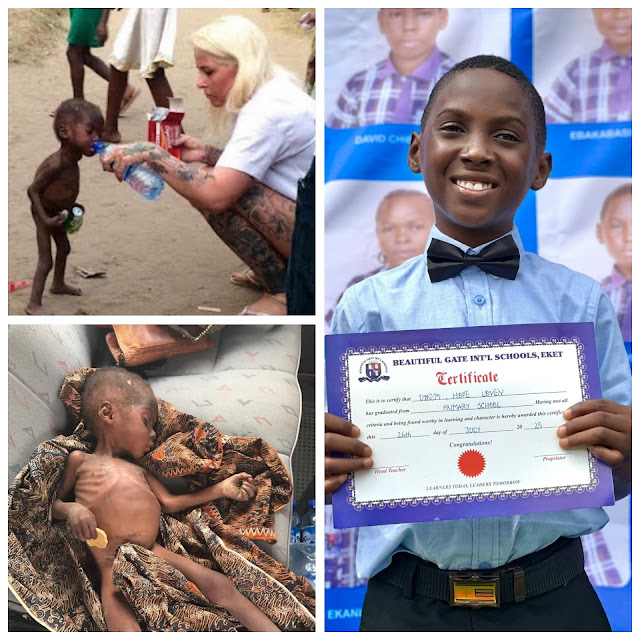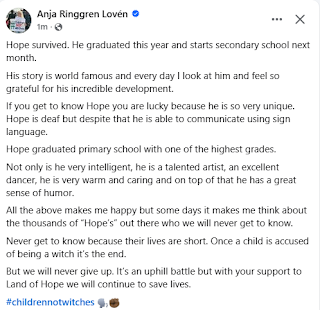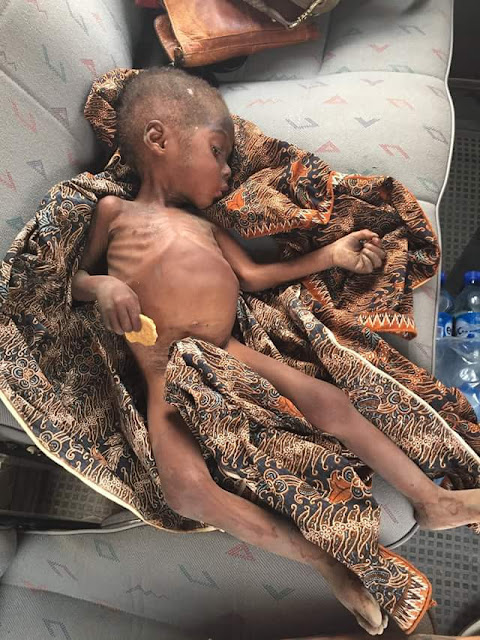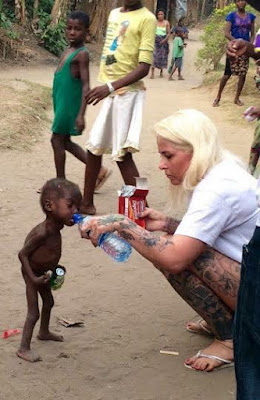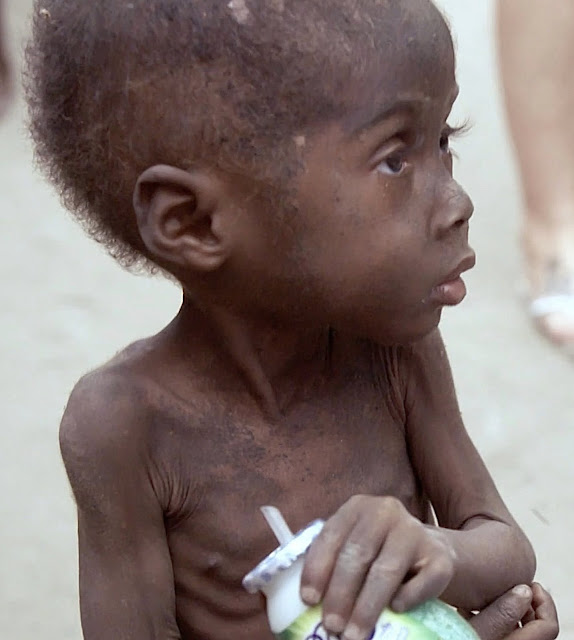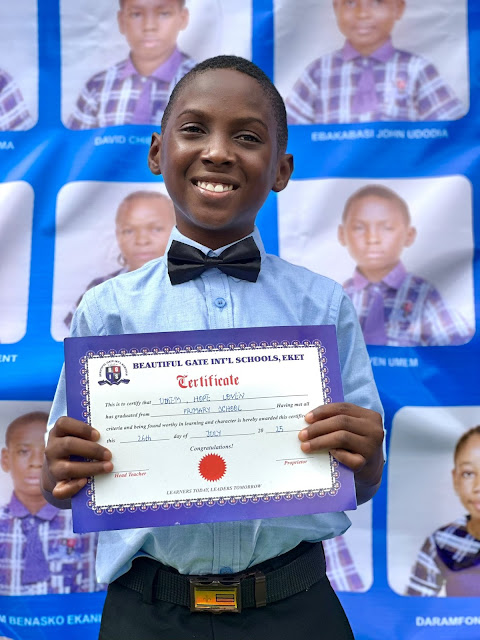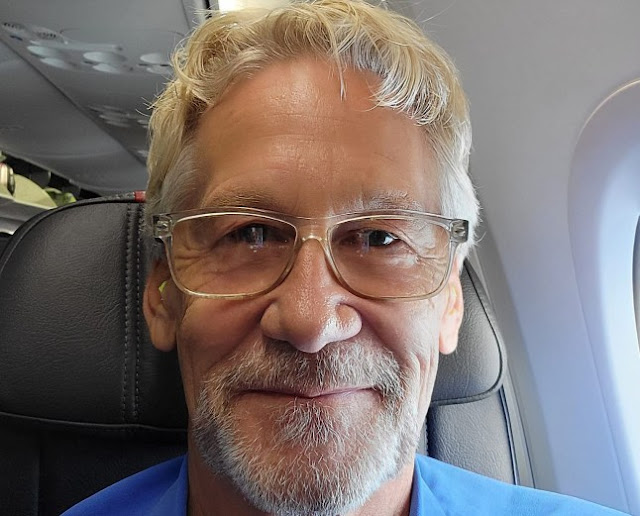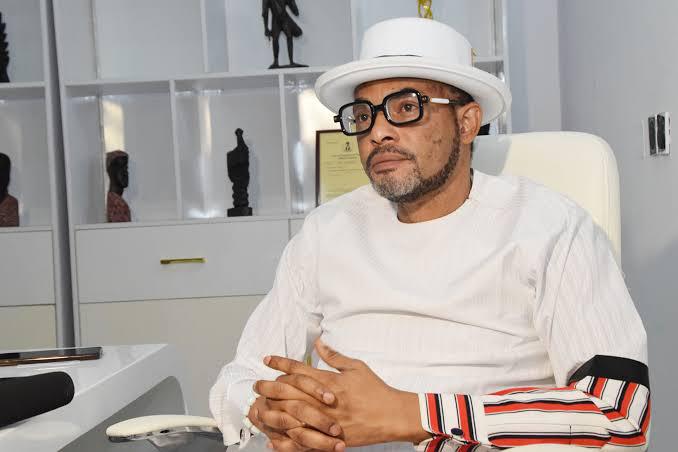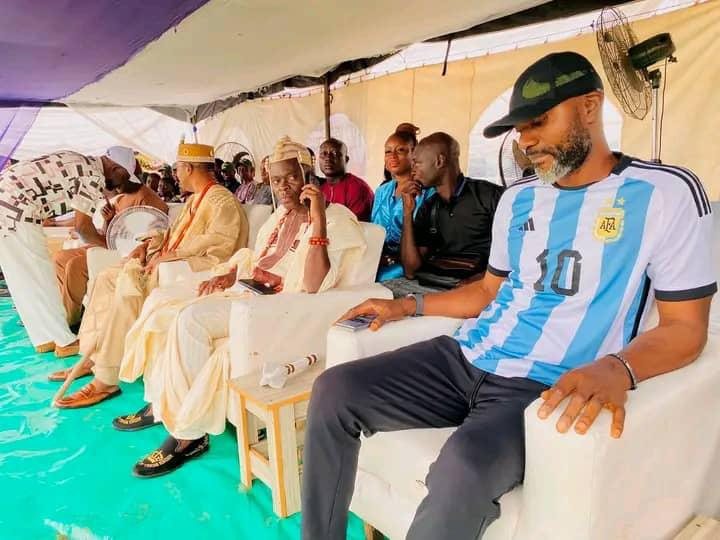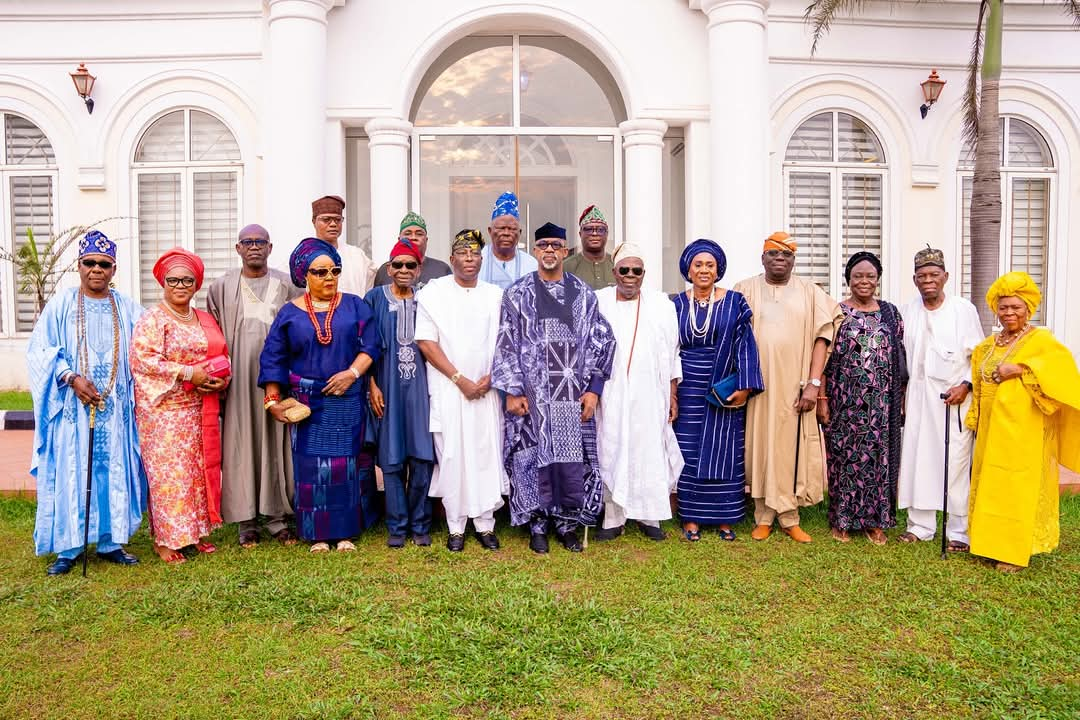In a story that has captured hearts worldwide, a photograph from January 30, 2016, remains etched in the collective memory of those who champion compassion and resilience. The image shows Danish aid worker Anja Ringgren Lovén kneeling beside a severely malnourished 2-year-old boy in Akwa Ibom, Nigeria, offering him water from a bottle. The boy, later named Hope, had been branded a witch by his family and abandoned to wander the streets, left to face starvation and death. Rescued by Lovén and her husband, David Emmanuel Umem, through their organization, the African Children’s Aid Education and Development Foundation (ACAEDF), also known as “Land of Hope,” Hope not only survived but thrived against all odds. Fast forward to July 2025, and Hope has achieved a remarkable milestone: graduating from primary school with one of the highest grades in his class, poised to begin secondary school in September. This extraordinary journey, shared by Lovén in a heartfelt Facebook post on August 25, 2025, underscores the transformative power of love, care, and opportunity, while highlighting the ongoing fight against the devastating practice of labeling children as witches in Nigeria.
The Rescue That Changed a Life
On that fateful day in January 2016, Anja Ringgren Lovén received a phone call that would alter the course of a young boy’s life. The call alerted her to a 2-year-old child in Akwa Ibom, Nigeria, who had been abandoned by his family after being accused of witchcraft. Such accusations, rooted in superstition and often fueled by poverty, illness, or misfortune, are tragically common in parts of Nigeria, particularly in the South-South region. Children branded as witches are frequently subjected to abuse, abandonment, or even death, as communities believe they are responsible for spiritual or material misfortunes.
Without hesitation, Lovén mobilized a rescue team, including her husband, David Emmanuel Umem, to locate the boy. When they found him, he was in a dire state—severely malnourished, dehydrated, and barely clinging to life after months of wandering the streets. The image of Lovén giving water to the emaciated child, his skeletal frame a stark testament to his suffering, went viral, drawing global attention to the plight of children accused of witchcraft. The boy, whom Lovén named Hope, was immediately taken to the Land of Hope, a children’s home and educational center established by Lovén and Umem to provide shelter, care, and education to vulnerable children.
The rescue was not just a moment of compassion but a bold statement against the harmful cultural practices that endanger children in Nigeria. At the Land of Hope, Hope received urgent medical attention, nutritious food, and a safe environment to begin his recovery. The organization’s holistic approach, which combines physical care with emotional and educational support, gave Hope the foundation he needed to rebuild his life. Against all odds, including the challenge of being deaf, Hope began to thrive, defying the grim fate that awaited him on the streets of Akwa Ibom.
Hope’s Remarkable Journey
Hope’s story is one of extraordinary resilience and triumph. When he was rescued, his survival was uncertain, given the extent of his malnourishment and the physical toll of months without care. Yet, under the dedicated care of Lovén, Umem, and the Land of Hope team, Hope not only survived but began to flourish. His journey from a frail, abandoned child to a vibrant, intelligent young boy is a testament to the power of love, support, and opportunity.
One of the significant challenges Hope faced was his deafness, a condition that could have limited his development in an environment without adequate resources. However, at the Land of Hope, he was provided with specialized support, including training in sign language, which enabled him to communicate effectively. This accommodation was crucial in allowing Hope to engage with his peers, participate in education, and express his vibrant personality. Lovén’s commitment to inclusive care ensured that Hope’s disability did not define his potential, but rather became a part of his unique story.
Fast forward to July 2025, and Hope’s progress has been nothing short of remarkable. In a Facebook post on August 25, 2025, Lovén shared the joyous news that Hope had graduated from primary school with one of the highest grades in his class. This academic achievement is a milestone that few could have predicted when he was rescued nine years ago. “Hope survived. He graduated this year and starts secondary school next month,” Lovén wrote. “His story is world famous, and every day I look at him and feel so grateful for his incredible development.”
Hope’s success extends beyond academics. Lovén described him as a multifaceted individual with a range of talents and qualities that make him truly special. “If you get to know Hope, you are lucky because he is so very unique,” she wrote. “Hope is deaf but despite that he is able to communicate using sign language. Not only is he very intelligent, he is a talented artist, an excellent dancer, he is very warm and caring, and on top of that he has a great sense of humor.” These attributes paint a picture of a young boy who has not only overcome immense adversity but has also developed into a well-rounded individual with a bright future ahead.
The Significance of Hope’s Graduation
Hope’s graduation from primary school is more than a personal achievement; it is a symbol of hope and possibility for countless other children facing similar challenges in Nigeria. His academic success, achieved despite his disability and traumatic early years, highlights the transformative impact of the Land of Hope’s work. By providing a nurturing environment, access to education, and specialized support for children with disabilities, the organization has enabled Hope to defy the odds and achieve his potential.
The transition to secondary school in September 2025 marks a new chapter in Hope’s journey. Secondary education will offer him opportunities to further develop his skills, pursue his interests in art and dance, and prepare for a future where he can contribute meaningfully to society. His high grades in primary school suggest a strong foundation for academic success, and with continued support from the Land of Hope, Hope is well-positioned to excel in his next educational phase.
Lovén’s pride in Hope’s achievements is palpable, but her Facebook post also reflects a deep awareness of the broader context. “All the above makes me happy, but some days it makes me think about the thousands of ‘Hope’s’ out there who we will never get to know,” she wrote. “Never get to know because their lives are short. Once a child is accused of being a witch, it’s the end.” This sobering reflection underscores the ongoing challenge of addressing the practice of branding children as witches, a deeply rooted issue that continues to claim lives and futures across Nigeria.
The Witchcraft Stigma in Nigeria
The practice of labeling children as witches remains a significant human rights issue in Nigeria, particularly in states like Akwa Ibom, Cross River, and parts of the Niger Delta. Rooted in a mix of traditional beliefs, religious extremism, and socio-economic factors, these accusations often target vulnerable children—orphans, those with disabilities, or those born into families facing hardship. Once branded a witch, a child may be subjected to physical abuse, abandonment, or even ritualistic killing, as communities seek to “cleanse” themselves of perceived evil.
The consequences of these accusations are devastating. Children like Hope are cast out by their families and communities, left to fend for themselves in environments where survival is nearly impossible. Malnutrition, disease, and violence claim countless lives, while those who survive often face lifelong trauma and stigmatization. The lack of legal protections and widespread ignorance about the causes of misfortune—such as poverty or illness—perpetuate this cycle of abuse.
Organizations like the Land of Hope are working tirelessly to combat this issue, but the scale of the problem is immense. Lovén’s work focuses not only on rescuing and rehabilitating children but also on raising awareness and advocating for systemic change. By sharing Hope’s story, she aims to highlight the human cost of witchcraft accusations and galvanize support for efforts to protect vulnerable children. “We will never give up,” Lovén wrote. “It’s an uphill battle, but with your support to Land of Hope, we will continue to save lives.”
The Land of Hope: A Beacon of Change
The African Children’s Aid Education and Development Foundation (ACAEDF), or Land of Hope, was founded by Anja Ringgren Lovén and David Emmanuel Umem to address the needs of vulnerable children in Nigeria. Based in Akwa Ibom, the organization provides a safe haven for children who have been abused, abandoned, or accused of witchcraft. Through a combination of rescue operations, medical care, education, and emotional support, the Land of Hope seeks to give these children a second chance at life.
The organization’s work is grounded in a holistic approach that addresses both immediate and long-term needs. Upon rescue, children receive medical treatment to address malnutrition, injuries, and illnesses. They are then enrolled in educational programs tailored to their needs, including support for those with disabilities, like Hope’s sign language training. The Land of Hope also provides psychological care to help children overcome the trauma of abuse and abandonment, fostering a sense of belonging and self-worth.
Beyond individual care, the Land of Hope is committed to advocacy and community engagement. Lovén and Umem work with local leaders, schools, and religious institutions to challenge the beliefs that fuel witchcraft accusations. They also collaborate with government agencies to push for stronger legal protections for children and greater enforcement of existing laws against child abuse and abandonment. These efforts are critical in addressing the root causes of the problem and creating a safer environment for children across Nigeria.
Hope’s story is a powerful example of the Land of Hope’s impact. His transformation from a malnourished, abandoned toddler to a thriving, intelligent, and talented young boy demonstrates the potential for change when children are given the care and opportunities they deserve. The organization’s work has saved countless lives, but Lovén acknowledges that thousands of other children remain at risk, underscoring the need for continued support and awareness.
Global Impact and Ongoing Challenges
Hope’s story, amplified by the viral photograph from 2016, has had a profound impact on a global scale. The image of Lovén giving water to a starving child sparked an outpouring of support, with donations pouring in to support the Land of Hope’s work. It also brought international attention to the issue of witchcraft accusations, prompting discussions about child rights, cultural practices, and the role of humanitarian organizations in addressing systemic issues.
However, the challenges remain daunting. The persistence of witchcraft accusations in Nigeria reflects deep-seated cultural and socio-economic issues that require long-term solutions. Poverty, lack of education, and religious extremism continue to drive these practices, making it difficult to eradicate them entirely. The Land of Hope relies heavily on donations and international support to sustain its operations, and expanding its reach to help more children requires significant resources.
Lovén’s call for support in her August 25, 2025, Facebook post is a reminder of the ongoing need for collective action. “With your support to Land of Hope, we will continue to save lives,” she wrote. This appeal underscores the importance of global solidarity in addressing the plight of children accused of witchcraft. By supporting organizations like the Land of Hope, individuals and institutions can contribute to a future where no child is abandoned or abused due to superstition.
Hope’s Legacy and the Path Forward
Hope’s graduation from primary school is a moment of triumph, not only for him but for all those who have supported his journey. His story is a beacon of hope, demonstrating that even the most vulnerable children can overcome adversity with the right care and opportunities. As he prepares to enter secondary school, Hope’s future is bright, filled with possibilities that were unimaginable when he was rescued nine years ago.
Yet, as Lovén poignantly noted, Hope’s success also serves as a reminder of the thousands of other children who never get a chance to thrive. The fight against witchcraft accusations and child abandonment is far from over, and organizations like the Land of Hope need continued support to make a lasting impact. This includes not only financial contributions but also advocacy, education, and policy changes to address the root causes of these issues.
For Nigeria, Hope’s story is a call to action. The government, civil society, and religious leaders must work together to eradicate harmful cultural practices and protect vulnerable children. Strengthening child protection laws, improving access to education, and addressing poverty are critical steps in creating a society where no child is labeled a witch or left to die.
For the global community, Hope’s journey is a reminder of the power of compassion and the importance of standing up for the most vulnerable. Anja Ringgren Lovén’s work, alongside her husband and their team at the Land of Hope, has shown that change is possible, one child at a time. As Hope embarks on the next chapter of his life, his story continues to inspire, challenging us all to do more to ensure that every child has the chance to thrive.


